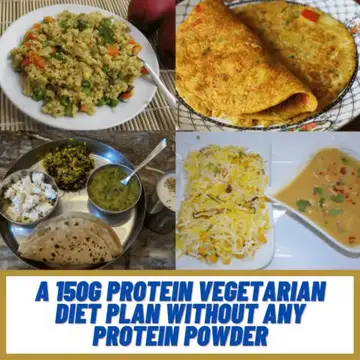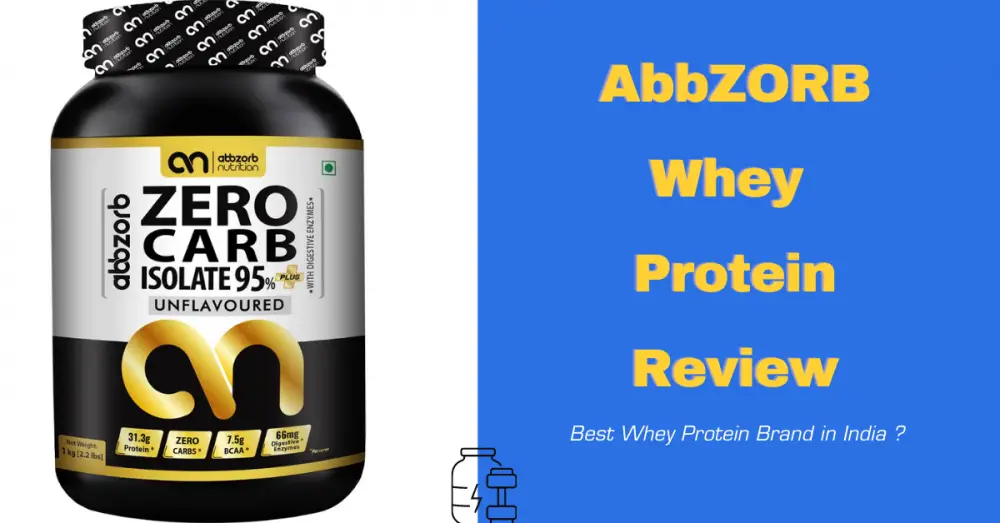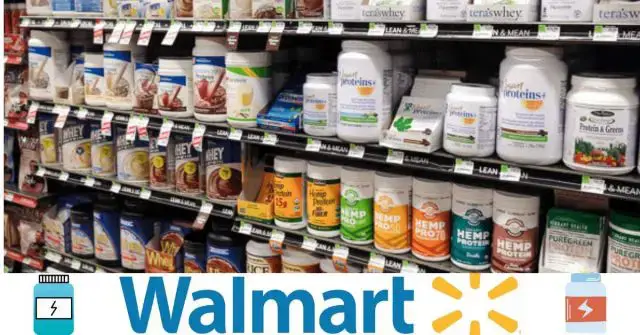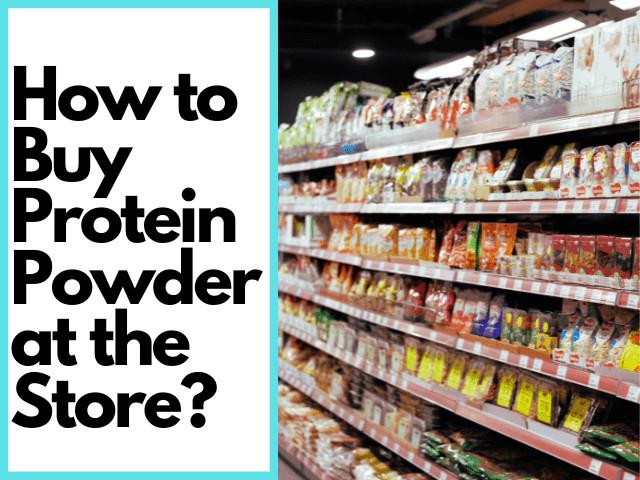A lot of people ask me,
- Is it possible to eat 150 grams of Protein on a vegetarian diet?
- I don’t like whey protein; how can I have a high-protein vegetarian diet at home?
- Is it necessary to use whey protein powders or protein bars for daily protein nourishment?
- What are the benefits of using whey protein for a high-protein vegetarian diet?
- Planning a Vegetarian Diet lifestyle, but don’t know how to start?
If you also have these questions, have a thorough reading of this blog post. I assure you, You’ll get the answer to all your questions.
There are more than 370 million vegetarians around the world, and the number is growing every day. There is a popular misconception/myth that you can’t eat high Protein on a vegetarian diet.
High Protein Vegetarian Diet Without Protein Powders

The vegetarian category includes three types
1. People Who Eat Eggs and Dairy
These people are also known as Lacto Ovo vegetarians.
Eggs and dairy are great sources of good-quality protein. Fulfilling daily protein requirements is not a problem for Lacto-Ovo vegetarians.
One egg has four grams of protein, and dairy products like whey protein, cheese, yogurt, and cheese are great for Protein.
A 150gms Protein Lacto OVO vegetarian diet plan without any whey protein powder.
|
Meals |
Ingredients |
Macros |
|
Meal 1 (Omelette and Oats Smoothie) |
– For Omelette [Egg whites(4) + whole eggs(2)] – For Smoothie [Oats(50gm)+ Milk(100ml)+ banana(1)]
|
Protein = 30-35gm Carbs = 65-70gm Fat = 10-15gm Calories = 700-750kcal |
|
Meal 2 (Rice, Lentil, and soya chunks) |
Rice(80gm) + dal(lentils 100gm) + SoyaChunks (80gm) |
Protein = 65gm Carbs = 55-60gm Fat = 5-10gm Calories = 545-560kcal |
|
Meal 3 (Omelete) |
Egg whites (6) + whole egg(1) + 1 Apple/ Orange |
Protein = 25gm Carbs = 2-3gm Fat = 2-3gm Calories = 135kcal |
|
Meal 4 (Paneer + Salad) |
(Cottage cheese= 150gm) + Salad |
Protein = 30gm Carbs = 8-9gm Fat = 29gm Calories = 510kcal |
Macros of Lacto OVO Vegetarian Meal Plan
- Total Protein = 150gm
- Total Calories = 1950-2000kcal
- Total Carbs = 142gm
- Total Fat = 57gm
2. People Who Consume Dairy But Not Eggs
Also known as Lacto-vegetarians. The majority of vegetarians around the world are Lacto-vegetarians. Dairy is one primary complete protein source for Lacto vegetarians.
Dairy includes whey protein, protein bars made using milk, cheese, cottage cheese, milk, yogurt, etc.
Since we are not using any supplement for this high-protein diet plan, we will not use whey protein powder or protein bars.
Let’s make a Lacto-vegetarian diet plan.
The meal plan is pretty much the same as Lacto-OVO, but here we’ll not use eggs. Instead of that, we’ll increase the quantity of cottage cheese, dal, and soya chunks to complete the 150 grams of Protein.
|
Meals |
Ingredients |
Macros |
|
Meal 1 (Milk & Oats Smoothie with Almonds) |
Oats(50gm)+ Milk(100ml)+ Almonds(50gm) |
Protein = 20-22gm Carbs = 45-50gm Fat = 30-32gm Calories = 540-550kcal |
|
Meal 2 (Rice, Lentil, and soya chunks) |
Rice(80gm) + dal(lentils 100gm) + SoyaChunks (80gm) |
Protein = 65gm Carbs = 55-60gm Fat = 5-10gm Calories = 545-560kcal |
|
Meal 3 (Chickpeas Yogurt) |
Chickpeas (80gm) + Yogurt (200gm) |
Protein = 23gm Carbs = 50gm Fat = 10gm Calories = 400kcal |
|
Meal 4 (Cottage cheese+ roti) |
Cottage cheese (200gm) + Roti(wheat flour 50gm) + Salad |
Protein = 40gm Carbs = 30-35gm Fat = 35-40gm Calories = 670kcal |
Macros of LactoOVO Vegetarian Meals
- Total Protein = 150gm
- Total Calories = 2180-2200kcal
- Total Carbs = 190-200gm
- Total Fat = 85-90gm
3. People Who Eat Eggs but Not Dairy Products
The Last category, is also known as Ovo-Vegetarians. People who have allergies to dairy products and can’t eat meat, fish, etc., are mostly Ovo-vegetarians.
Since the egg is a great lean source of protein, most Ovo vegetarians rely on eggs to fulfill daily protein needs.
Let’s make a sample meal to get 150gms of Protein on an Ovo-vegetarian diet without protein powder.
Most of the meals are the same except for dairy products. We will use tofu instead of cottage cheese and almond milk instead of whole milk.
|
Meals
|
Ingredients |
Macros |
|
Meal 1 (Omelette and Oats Smoothie) |
– For Omelette [Egg whites(5) + whole eggs(2)] |
Protein = 25-30gm Carbs = 50-60gm Fat = 5-10gm Calories = 450-500kcal |
|
Meal 2 (Rice, Lentil, and soya chunks ) |
Rice(80gm) + dal(lentils 100gm) + SoyaChunks (100gm) |
Protein = 70-73gm Carbs = 65-70gm Fat = 5-10gm; Calories = 600-700kcal |
|
Meal 3 (Omelete) |
Egg whites (6) + whole egg(1) + 1 Apple/ Orange |
Protein = 25gm Carbs = 2-3gm Fat = 2-3gm Calories = 135kcal |
|
Meal 4 (Tofu) |
Tofu(200gm) + Salad |
Protein = 20gm Carbs = 3-4gm Fat = 12gm Calories = 170kcal |
Macros of Lacto-OVO vegetarian diet
- Total Protein = 140-145gm
- Total Calories = 1500-1600kcal (approx)
- Total Carbs = 135-145gm
- Total Fat = 30-35gm
This sample meal plan proves that you can get a high-protein vegetarian meal without a protein powder supplement. Everything here is organic and homemade.
I tried to keep the daily calorie count under 2000 calories.
Also. Read- Designer Whey Protein Powder Review – Is It Worth Trying?
Now, it’s clear that achieving 150gms Protein in a vegetarian meal is possible; we will discuss the main differences between protein supplements in a diet vs. a diet without a protein supplement.
No Supplement Vs. Supplement Diet Difference
Hard to keep the daily calories under the threshold if you are following a calorie-deficit diet. Example- 1300 to 1500 kcal diet for fat loss.
Protein supplements like whey protein provide a good amount of Protein at a low-calorie count.
Whey protein has the highest biological value of Protein, and it is one of the fast-absorbing proteins. One serving of whey protein has 20 to 25 grams of protein and just 110-140 calories.
You can’t find any vegetarian food that provides you with 25 grams of Protein at just 120 calories. Even high protein food like soya chunks, cheese, yogurt, or milk has high additional carbs and fats.
Is It Necessary to use Whey Protein for fat loss or muscle building?
No. Whey protein is not necessary to use whey protein for fat loss or muscle building. If you can get your daily macros recommendation from the food you eat, there is no need to spend money on whey protein.
For example- If your daily calorie recommendation is 2000 for muscle building, you can follow the sample meal plan we discussed in this blog earlier.
Who Should Use Whey Protein?
If you follow a low-calorie diet and don’t have enough options to get enough protein, you can use whey protein in your diet. It is an easy option for high-quality Protein at a low-calorie count.
Who Can Use Whey Protein?
Anyone over the age of fifteen can use whey protein powder. Whey protein is a milk byproduct like cheese, butter, cream, yogurt, etc.
Whey protein supplement brands like Abbzorb, ASITIS, and Nakpro are among the best whey protein isolates in the Indian market.
Hundreds of thousands of athletes use whey protein for faster recovery and muscle growth.
Fast digestibility, protein bioavailability, biological value, and multiple flavors are some of the reasons that make whey protein the most-sold supplement around the world. [Read- Whey Protein Worldwide Market]
Disclaimer
Everything I share on this blog is meant to be informative only. I am not asking you to follow the exact meal plan. Diet plans vary from person to person, and it depends on several factors; it’s not right that one particular diet plan will work for everyone. If you have any medical condition, I highly recommend consulting your doctor first. Blindly following any diet plans may result in health complications I am not responsible for.
Conclusion
A supplement is only an additional-on to the food you eat, and your diet/meals are the basis of everything. Supplements help fulfill daily protein, vitamins, and minerals recommendations in a limited calorie count.
Supplements are only worth it if your overall diet is clean and well-balanced, and your workout and rest are proper.
Don’t waste money on supplements if you’re eating junk/fast food and using supplements, thinking they will do everything for you.
I hope this blog post helped you in some way. If you have any questions, please ask them in the comment section.
![How To Get 150g of Protein On A Vegetarian Diet Without Any Protein Powder? [2024]](https://caronwhaley.com/wp-content/uploads/2024/03/How-To-Get-150g-of-Protein-On-A-Vegetarian-Diet-Without-Any-Protein-Powder.webp)


